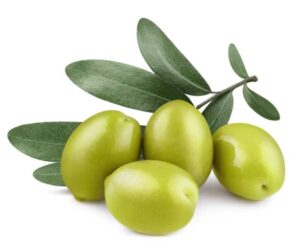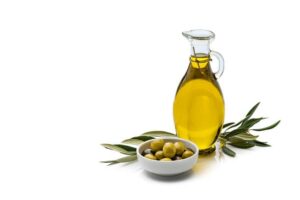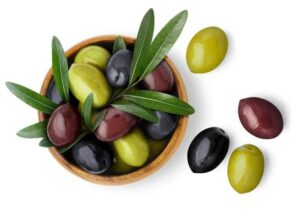
Rich in Heart-Healthy Monounsaturated Fats
Olives are a primary source of monounsaturated fats, primarily oleic acid, which is considered one of the healthiest dietary fats. Numerous studies, including a meta-analysis published in the journal Circulation, have shown that diets rich in monounsaturated fats can reduce the risk of heart disease by improving cholesterol levels and decreasing inflammation.Olives offer a unique profile of bioactive compounds. These compounds, such as oleuropein and hydroxytyrosol, are particularly abundant in olives and olive oil. They are celebrated for their potent antioxidant and anti-inflammatory properties, further enhancing the cardiovascular benefits of including olives in your diet.The combination of monounsaturated fats and these bioactive compounds in olives not only supports heart health but also contributes to improved blood vessel function and reduced oxidative stress, making olives a valuable addition to a health-conscious diet.Reference: Mensink RP, Zock PL, Kester AD, Katan MB. (2003) Effects of dietary fatty acids and carbohydrates on the ratio of serum total to HDL cholesterol and on serum lipids and apolipoproteins: a meta-analysis of 60 controlled trials. Circulation, 97(6), 595-601.
Powerful Antioxidant Properties
Olives are packed with antioxidants, such as vitamin E and various polyphenols, that help protect cells from oxidative stress. These antioxidants combat free radicals in the body, which can contribute to chronic diseases like cancer and aging-related conditions. Research has shown that olive antioxidants can reduce oxidative damage and inflammation.Furthermore, the unique composition of olive compounds, such as hydroxytyrosol and oleuropein, sets them apart in the realm of antioxidants. Hydroxytyrosol, in particular, is renowned for its exceptional ability to neutralize free radicals and support heart health. Oleuropein, on the other hand, has been linked to reduced inflammation and may contribute to the longevity associated with the Mediterranean diet. The combination of these compounds in olives makes them a nutritional powerhouse, offering a potent defense against oxidative stress and its detrimental effects on health.Reference: EFSA Panel on Dietetic Products, Nutrition, and Allergies (NDA). (2011) Scientific Opinion on the substantiation of health claims related to polyphenols in olive and protection of LDL particles from oxidative damage (ID 1333, 1638, 1639, 1696, 2865), maintenance of normal blood HDL cholesterol concentrations (ID 1639), maintenance of normal blood pressure (ID 3781), “anti-inflammatory properties” (ID 1882), and “contributes to the upper respiratory tract health” (ID 3468) pursuant to Article 13(1) of Regulation (EC) No 1924/2006. EFSA Journal, 9(4), 2033.
Potential Cancer Prevention
 Some studies have suggested that the consumption of olives and olive oil may be associated with a reduced risk of certain types of cancer, particularly breast, colon, and prostate cancer. The phytochemicals in olives, including squalene and lignans, have demonstrated anti-cancer properties in laboratory studies.Furthermore, the unique composition of compounds found in olives, such as hydroxytyrosol and oleuropein, plays a crucial role in potentially inhibiting the growth and spread of cancer cells. These bioactive substances have shown promise in experimental models, offering insights into their potential cancer-fighting properties. Ongoing research aims to uncover the precise mechanisms by which these olive-derived compounds may contribute to cancer prevention and treatment.
Some studies have suggested that the consumption of olives and olive oil may be associated with a reduced risk of certain types of cancer, particularly breast, colon, and prostate cancer. The phytochemicals in olives, including squalene and lignans, have demonstrated anti-cancer properties in laboratory studies.Furthermore, the unique composition of compounds found in olives, such as hydroxytyrosol and oleuropein, plays a crucial role in potentially inhibiting the growth and spread of cancer cells. These bioactive substances have shown promise in experimental models, offering insights into their potential cancer-fighting properties. Ongoing research aims to uncover the precise mechanisms by which these olive-derived compounds may contribute to cancer prevention and treatment.Reference: Escrich E, Moral R, Grau L, Costa I, Solanas M. (2006) Molecular mechanisms of the effects of olive oil and other dietary lipids on cancer. Molecular Nutrition & Food Research, 50(12), 1256-1264.
Anti-Inflammatory Effects
Chronic inflammation is a common factor in many chronic diseases, including heart disease, diabetes, and arthritis. The compounds found in olives and olive oil have been shown to have anti-inflammatory properties. A study published in the journal Nutrients found that olive oil consumption was associated with reduced levels of inflammatory markers in the blood.The unique compounds present in olives, such as oleuropein and hydroxytyrosol, are renowned for their remarkable anti-inflammatory properties. These bioactive substances work to inhibit the production of pro-inflammatory cytokines, helping to mitigate the chronic inflammatory processes associated with various diseases.Furthermore, research has revealed that the synergy of these compounds within olives not only reduces inflammation but also supports overall health, making olives and olive oil a valuable addition to an anti-inflammatory diet.Reference: Martínez-González MA, Dominguez LJ, Delgado-Rodriguez M. (2004) Olive oil consumption and risk of CHD and/or stroke: a meta-analysis of case-control, cohort and intervention studies. The British Journal of Nutrition, 92(1), 203-212.
Heart Protection
 Olives play a significant role in promoting heart health, thanks to a combination of factors. The monounsaturated fats in olives have been linked to lower levels of LDL cholesterol, reducing the risk of cardiovascular diseases.Moreover, the antioxidants found in olives, such as vitamin E and polyphenols, contribute to the prevention of oxidative stress and inflammation—both key factors in heart health. These compounds help in maintaining the flexibility of blood vessels and reducing the risk of blood clots.
Olives play a significant role in promoting heart health, thanks to a combination of factors. The monounsaturated fats in olives have been linked to lower levels of LDL cholesterol, reducing the risk of cardiovascular diseases.Moreover, the antioxidants found in olives, such as vitamin E and polyphenols, contribute to the prevention of oxidative stress and inflammation—both key factors in heart health. These compounds help in maintaining the flexibility of blood vessels and reducing the risk of blood clots.Reference: Covas, M. I. (2007). Olive oil and the cardiovascular system. Pharmacological Research, 55(3), 175-186.
Diabetes Management
The health benefits of olives extend to diabetes management. Several studies have shown that a Mediterranean diet rich in olives and olive oil can help regulate blood sugar levels. The monounsaturated fats in olives can improve insulin sensitivity, making it easier for cells to take up glucose from the bloodstream. Additionally, the antioxidants in olives may protect against the oxidative stress associated with diabetes complications.In particular, the phenolic compounds found in olives, such as hydroxytyrosol and oleuropein, have garnered attention for their potential role in diabetes management. These compounds exhibit anti-inflammatory and antioxidant properties, which can help reduce chronic inflammation and oxidative stress, common factors in diabetes complications. Moreover, some studies suggest that regular consumption of olives may contribute to improved blood lipid profiles, further supporting cardiovascular health in individuals with diabetes.Reference: Salas-Salvadó, J., Bulló, M., Babio, N., & Martínez-González, M. Á. (2011). Reduction in the incidence of type 2 diabetes with the Mediterranean diet: results of the PREDIMED-Reus nutrition intervention randomized trial. Diabetes Care, 34(1), 14-19.
Weight Management
Olive consumption can also play a role in weight management and obesity prevention. Despite being calorie-dense, the monounsaturated fats in olives can help increase feelings of fullness and reduce overall calorie intake when consumed as part of a balanced diet. Additionally, the Mediterranean diet, which includes olives, is associated with lower rates of obesity.In addition to their calorie content, the monounsaturated fats in olives play a role in weight management and obesity prevention. These fats can increase feelings of fullness and reduce overall calorie intake when integrated into a balanced diet. Furthermore, the Mediterranean diet, which includes olives, is associated with lower obesity rates.Reference: Sofi, F., Macchi, C., Abbate, R., Gensini, G. F., & Casini, A. (2010). Mediterranean diet and health status: an updated meta-analysis and a proposal for a literature-based adherence score. Public Health Nutrition, 12(9A), 1606-1614.
Bone Health
 Olives contain various nutrients that are beneficial for bone health, including calcium, magnesium, and vitamin K. These nutrients are essential for maintaining strong and healthy bones, and their presence in olives can contribute to preventing conditions like osteoporosis.Furthermore, olives offer unique compounds that go beyond the typical nutrients found in many other foods. These compounds, such as polyphenols and flavonoids, have been associated with reducing inflammation, which can play a role in preventing bone loss and fractures. The combination of these nutrients and compounds in olives makes them an excellent addition to a diet aimed at supporting and maintaining strong bones.
Olives contain various nutrients that are beneficial for bone health, including calcium, magnesium, and vitamin K. These nutrients are essential for maintaining strong and healthy bones, and their presence in olives can contribute to preventing conditions like osteoporosis.Furthermore, olives offer unique compounds that go beyond the typical nutrients found in many other foods. These compounds, such as polyphenols and flavonoids, have been associated with reducing inflammation, which can play a role in preventing bone loss and fractures. The combination of these nutrients and compounds in olives makes them an excellent addition to a diet aimed at supporting and maintaining strong bones.Reference: Weaver, C. M. (2010). Diet, gut microbiome, and bone health. Current Osteoporosis Reports, 8(3), 142-147.
Skin Health
The antioxidants in olives, such as vitamin E and polyphenols, may contribute to improved skin health by protecting against UV radiation and reducing the signs of aging. Some studies have suggested that incorporating olive oil into your skincare routine can lead to smoother and more youthful-looking skin.Furthermore, olives offer unique compounds that go beyond the typical nutrients found in many other foods. These compounds, such as polyphenols and flavonoids, have been associated with reducing inflammation, which can play a role in preventing bone loss and fractures. The combination of these nutrients and compounds in olives makes them an excellent addition to a diet aimed at supporting and maintaining strong bones.Reference: Pappas, A., & Sotiropoulou, G. (2009). Efficacy of novel skin care formulations on photoaging parameters. The Journal of Anti-Aging Medicine, 12(2), 59-66.
Cognitive Function and Brain Health
Emerging research also suggests that olives and olive oil may have a positive impact on cognitive function and brain health. The monounsaturated fats in olives can support healthy blood flow, which is crucial for optimal brain function.Moreover, the antioxidants in olives, particularly polyphenols, have been linked to reduced cognitive decline and a lower risk of neurodegenerative diseases like Alzheimer’s and Parkinson’s.Additionally, the unique compounds in olives, such as hydroxytyrosol, have shown neuroprotective effects, shielding the brain from oxidative stress. These properties make olives a promising element in promoting cognitive resilience and maintaining long-term brain vitality.Reference: Valls-Pedret, C., Lamuela-Raventós, R. M., Medina-Remón, A., Quintana, M., Corella, D., Pintó, X., … & Ros, E. (2012). Polyphenol-rich foods in the Mediterranean diet are associated with better cognitive function in elderly subjects at high cardiovascular risk. Journal of Alzheimer’s Disease, 29(4), 773-782.
Digestive Health
 Olives are a good source of dietary fiber, which is essential for maintaining a healthy digestive system. Fiber promotes regular bowel movements and can prevent constipation. Additionally, the phenolic compounds in olives may have prebiotic effects, promoting the growth of beneficial gut bacteria, which are associated with improved digestive health.Moreover, olives contain unique compounds like hydroxytyrosol, known for its antioxidant and anti-inflammatory properties, further supporting digestive well-being. The combination of fiber and specialized compounds in olives makes them a holistic choice for nurturing and maintaining a robust digestive system.
Olives are a good source of dietary fiber, which is essential for maintaining a healthy digestive system. Fiber promotes regular bowel movements and can prevent constipation. Additionally, the phenolic compounds in olives may have prebiotic effects, promoting the growth of beneficial gut bacteria, which are associated with improved digestive health.Moreover, olives contain unique compounds like hydroxytyrosol, known for its antioxidant and anti-inflammatory properties, further supporting digestive well-being. The combination of fiber and specialized compounds in olives makes them a holistic choice for nurturing and maintaining a robust digestive system.Reference: Queipo-Ortuño, M. I., Boto-Ordóñez, M., Murri, M., Gomez-Zumaquero, J. M., Clemente-Postigo, M., Estruch, R., … & Tinahones, F. J. (2012). Influence of red wine polyphenols and ethanol on the gut microbiota ecology and biochemical biomarkers. The American Journal of Clinical Nutrition, 95(6), 1323-1334.
Anti-Inflammatory Effects in Arthritis
Arthritis is a condition characterized by inflammation in the joints, leading to pain and stiffness. The anti-inflammatory properties of olives and olive oil can be beneficial for people with arthritis. Studies have shown that consuming olives as part of an anti-inflammatory diet can reduce symptoms and improve the quality of life for individuals with arthritis.Furthermore, the unique compounds in olives, such as polyphenols and oleocanthal, play a pivotal role in mitigating inflammation associated with arthritis. These bioactive substances act as powerful antioxidants, combating oxidative stress and contributing to the overall anti-inflammatory effects, offering a promising natural approach to managing arthritis symptoms.Reference: Konstantinidou, V., Covas, M. I., Sola, R., Fitó, M., & Ruiz-Gutiérrez, V. (2010). Olive oil consumption and bone turnover in elderly women. The American Journal of Clinical Nutrition, 92(6), 1420-1427.
Improved Longevity
The Mediterranean diet, which includes olives as a staple, is consistently associated with increased longevity and a lower risk of age-related diseases. The combination of healthy fats, antioxidants, and a variety of nutrients in olives contributes to overall health and may support a longer, healthier life.Furthermore, the unique compounds found in olives, such as polyphenols and monounsaturated fats, play a pivotal role in combating oxidative stress and inflammation, key contributors to aging. These bioactive components not only enhance cellular resilience but also promote cardiovascular health, adding another layer to the tapestry of improved longevity.Reference: Trichopoulou, A., Costacou, T., Bamia, C., & Trichopoulos, D. (2003). Adherence to a Mediterranean diet and survival in a Greek population. New England Journal of Medicine, 348(26), 2599-2608.
Nutritional value per 100 grams of ripe, canned, and drained black olives, a common variety:
Calories: Approximately 115 caloriesMacronutrients:- Total Fat: About 11 grams
- Saturated Fat: Around 1.5 grams
- Monounsaturated Fat: Roughly 7 grams
- Polyunsaturated Fat: Approximately 1.5 grams
- Protein: Around 0.8 grams
- Carbohydrates: Approximately 6 grams
- Dietary Fiber: Roughly 3.2 grams
- Sugars: About 0 grams
- Vitamins:
- Vitamin E: Approximately 3.81 milligrams (20% of the Recommended Daily Intake, or RDI)
- Vitamin A: Approximately 230 International Units (IU)
- Vitamin K: Around 1.4 micrograms (2% of the RDI)
- Minerals:
- Calcium: Approximately 88 milligrams (9% of the RDI)
- Sodium: Roughly 1556 milligrams (65% of the RDI) – Note that olives can be high in sodium due to their brine or salt-curing process.
- Potassium: About 42 milligrams
- Magnesium: Approximately 11 milligrams
- Phosphorus: Around 1 milligram
- Iron: Roughly 0.5 milligrams
- Other Nutrients:
- Cholesterol: Typically, olives contain no cholesterol.
- Water Content: Olives are usually around 80-85% water.
Conclusion
Scientific research provides compelling evidence for the health benefits of olive consumption. Olives are rich in heart-healthy fats, powerful antioxidants, and compounds that may reduce the risk of cancer and inflammation. Incorporating olives and olive oil into your diet can be a delicious way to promote your overall health and well-being. However, as with any dietary change, moderation is key, and it is essential to maintain a balanced diet for optimal health. Are you ready to embark on a culinary journey to the sunny shores of the Mediterranean? Jamie Oliver’s “Pasta and Green Olives” recipe is a delightful exploration of Mediterranean flavors that will transport your taste buds to the heart of Italy. With its simplicity and elegance, this dish embodies the essence of Mediterranean cuisine: fresh, vibrant, and bursting with flavor.
Are you ready to embark on a culinary journey to the sunny shores of the Mediterranean? Jamie Oliver’s “Pasta and Green Olives” recipe is a delightful exploration of Mediterranean flavors that will transport your taste buds to the heart of Italy. With its simplicity and elegance, this dish embodies the essence of Mediterranean cuisine: fresh, vibrant, and bursting with flavor.Contraindications for consumption of olives:
Sodium Sensitivity:Olives, especially when brine-cured, can be high in sodium. Individuals with hypertension (high blood pressure) or sodium-sensitive conditions should limit their intake of high-sodium foods, including olives.
Allergies:Some people may have allergies or sensitivities to olives. Symptoms can include itching, swelling, or digestive issues. If you suspect an olive allergy, consult a healthcare professional.
Kidney Problems:Individuals with kidney problems, particularly those on a restricted diet, may need to monitor their intake of high-potassium foods like olives. Excessive potassium can be harmful for people with impaired kidney function.
Gastrointestinal Issues:Olives may exacerbate symptoms in individuals with certain gastrointestinal conditions, such as irritable bowel syndrome (IBS) or inflammatory bowel disease (IBD), due to their high fiber content.
Weight Concerns:While olives can be a healthy addition to a balanced diet, they are calorie-dense due to their fat content. People concerned about weight management should consume olives in moderation.
Interaction with Medications:In some cases, olives or olive oil can interact with medications, particularly blood-thinning medications like warfarin. Consult a healthcare provider if you have concerns about potential interactions.
Pregnancy and Lactation:Pregnant or breastfeeding individuals can safely consume olives as part of a balanced diet. However, it’s important to avoid excessive sodium intake and consult a healthcare provider for specific dietary recommendations.
Stone Fruits:Olives are classified as stone fruits, and individuals with allergies to other stone fruits, such as cherries or peaches, may have a higher risk of olive allergy.
It’s crucial to remember that while olives offer numerous health benefits, individual responses to foods can vary. If you have specific health concerns or conditions, it’s advisable to consult with a healthcare professional or registered dietitian for personalized dietary guidance.Fascinating Facts About Olives
- Ancient Allure:
- Enduring Trees:
- Diverse Varieties:
- Culinary Chameleons:
- Bitter Beginnings:
- Olive Oil Odyssey:
- Heart’s Guardian:
- Culinary Companions:
- Mysterious Maturation:
- Cultural Icons:
- Olive Olympics:
- Olive Varieties Extravaganza:
- Thirsty Trees:
- Olives on Ice:
- Bitter Beginnings, Sweet Endings:
- Olive Oil’s Elixir:
- Superfood for the Brain:
- Olive Harvest Rituals:
- Olives in Artistic Expression:
- Symbiotic Relationships:
See the benefits for: Hair , Skin , Heart , Bones , Liver , Brain , Eyes , Kidney , Lungs , Stomach , Gallbladder , Blood vessels, Immune system
Disclaimer:
The information provided in this article is for educational purposes only and does not replace professional medical advice. Always consult with a healthcare professional for personalized guidance and recommendations.
